History > QUESTIONS & ANSWERS > AP World History Exam Study Guide Questions and answers, 100% Accurate, graded A+ (All)
AP World History Exam Study Guide Questions and answers, 100% Accurate, graded A+
Document Content and Description Below
AP World History Exam Study Guide Questions and answers, 100% Accurate, graded A+ Civilization - ✔✔-An ambiguous term often used to denote more complex societies but sometimes used by anthro... pologists to describe any group of people sharing a set of cultural traits. Foragers - ✔✔-People who support themselves by hunting wild animals and gathering wild edible plants and insects. Cuneiform - ✔✔-A system of writing in which wedge-shaped symbols represented words or syllables. It originated in Mesopotamia and was used initially for Sumerian and Akkadian but later was adapted to represent other languages of western Asia. Because so many symbols had to be learned, literacy was confined to a relatively small group of administrators and scribes. History - ✔✔-The study of past events and changes in the development, transmission, and transformation of cultural practices. City-state - ✔✔-A small independent state consisting of an urban center and the surrounding agricultural territory. A characteristic political form in early Mesopotamia, classical Greece, Phoenicia, and early Italy. Culture - ✔✔-Socially transmitted patterns of action and expression. Material _____ refers to physical objects, such as dwellings, clothing, tools, and crafts. _____ also includes arts, beliefs, knowledge, and technology. Agricultural Revolution/Neolithic Revolution-When? - ✔✔-The change from food gathering to food production that occurred between 8000 and 2000 B.C.E., independently in various parts of the world. This also includes the domestication of plants and animals. Paleolithic - ✔✔-The period of the Stone Age associated with the evolution of humans. It predates the Neolithic period. Neolithic - ✔✔-The period of the Stone Age associated with the ancient Agricultural Revolution (s). It follows the Paleolithic period. Mohenjo-Darro - ✔✔-Largest of the cities of the Indus Valley civilization. It was centrally located in the extensive floodplain of the Indus River in contemporary Pakistan. Little is known about the political institutions of Indus Valley communities, but the large scale of construction at Mohenjo-Daro, the orderly grid for streets, and the standardization of building materials are evidence of central planning. Name the 4 river valleys where civilization began. - ✔✔-1) Mesopotamia, 2) Egypt, 3) Pakistan, 4) northern China What are the characteristics of civilization? - ✔✔-1) Cities that serve as administrative centers, 2) a political system based on control of defined territory, 3) specialization, 4) status based on wealth, 5) monumental buildings, 6) a writing system, 7) long distance trade, and 8) major advancements in science and art. Loess - ✔✔-A fine, light silt deposited by wind and water. It constitutes the fertile soil of the Yellow River Valley in northern China. Because _____ soil is not compacted, it can be worked with a simple digging stick, but it leaves the region vulnerable to devastating earthquakes. Daoism - ✔✔-Chinese school of thought, originating in the Warring States Period with Laozi. Daoism offered an alternative to the Confucian emphasis on hierarchy and duty. Daoists believe that the world is always changing and is devoid of absolute morality or meaning. They accept the world as they find it, avoid futile struggles, and deviate as little as possible from the Dao, or "path" of nature. Legalism - ✔✔-An authoritarian political philosophy that came to be called ____. These thinkers believe human nature is essentially wicked and that people behave in an orderly fashion only if compelled by strict laws and harsh punishments. Confucius - ✔✔-Western name for the Chinese philosopher Konzi (551-479 B.C.E.). His doctrine of duty and public service had a great influence on subsequent Chinese thought and served as a code of conduct for government officials. Mandate of Heaven - ✔✔-Chinese religious and political ideology developed by the Zhou, according to which it was the prerogative of Heaven, the chief deity, to grant power to the rule of China and to take away that power if the ruler failed to conduct himself justly and in the best interests of his subjects. Shang - ✔✔-The dominant people in the earliest Chinese dynasty for which we have written records (ca. 1750-1045 B.C.E.). Ancestor worship, divination by means of oracle bones, and the use of bronze vessels for ritual purposes were major elements of _____ culture. Hittites - ✔✔-A people from central Anatolia who established an empire in Anatolia and Syria in the late Bronze Age. With wealth from the trade in metals and military power based on chariot forces, the _____ vied with New Kingdom Egypt for control of Syria-Palestine before falling to unidentified attackers ca. 1200 B.C.E. Hatshepsut - ✔✔-Queen of Egypt (r. 1473-1458 B.C.E.). She dispatched a naval expedition down the Red Sea to Punt (possibly northeast Sudan or Eretria), the faraway source of myrrh. There is evidence of opposition to a woman as ruler, and after her death her name and image were frequently defaced. Akhenaten - ✔✔-Egyptian pharaoh (r. 1353-1335 B.C.E.) He built a new capital at Amarna, fostered a new style of naturalistic art, and created a religious revolution by imposing worship of the sun-disk. The Amarna letters, largely from his reign, preserve official correspondence with subjects and neighbors. Ramesses II - ✔✔-A long-lived ruler of New Kingdom Egypt (r. 1290-1224 B.C.E.). He reached an accommodation with the Hittites of Anatolia after a standoff in battle at Kadesh in Syria. He built on a grand scale throughout Egypt. Minoan - ✔✔-Prosperous civilization on the Aegean island of Crete in the second millennium B.C.E. The Minoans engaged in far-flung commerce around the Mediterranean and exerted powerful cultural influences on the early Greeks. Mycenae - ✔✔-Site of a fortified palace complex in southern Greece that controlled a Late Bronze Age kingdom. In Homer's epic poems Mycenae was the base of King Agamemnon, who commanded the Greeks besieging Troy. Contemporary archaeologists call the complex Greek society of the second millennium B.C.E. "Mycenaean." Library at Ashurbanipal - ✔✔-A large collection of writings drawn from the ancient literary, religious, and scientific traditions of Mesopotamia. It was assembled by the 7th-centry B.C.E. Assyrian ruler Ashurbanipal. The many tablets unearthed by archaeologists constitute one of the most important sources of present-day knowledge of the long literary tradition of Mesopotamia. Assyrians - ✔✔-Their kings were viewed as both gods and kings and the center of the universe. They were known as a warrior people who ruthlessly conquered neighboring countries. They used iron weapons, cavalry, couriers, signal fires, and spy networks as well as scare tactics and mass deportation to conquer others.Their control was more effective at the core and less effective in the peripheral parts of the empire. They consisted of free, land-owning citizens, farmers and artisans, and slaves. They preserved the knowledge inherited from older Mesopotamian societies and made original contributions to mathematics and astronomy. They maintained libraries that were attached to temples in the cities, such as the Library of Ashurbanipal in Ninevah. Hebrews - ✔✔-These people were nomadic herders and caravan drivers who developed a complex sedentary agricultural civilization. As they did so, their cult of a desert god evolved into an influential monotheistic religion. They were known by various names: Canaan, Israel, Palestine; Hebrews, Israelites, and Jews. Torah/Hebrew Bible - ✔✔-A collection of sacred books containing diverse materials concerning the origins, experiences, beliefs, and practices of the Israelites. Most of the extant text was compiled by members of the priestly class in the 5th century B.C.E. and reflects the concerns and views of this group. Solomon - ✔✔-The Israelite monarchy reached the height of its power in King ____'s reign (David's son), who forged alliances and sponsored trade with distant lands. He also expanded the bureaucracy and the army, and built the first temple in Jerusalem. Monotheism - ✔✔-Belief in the existence of a single divine entity. Some scholars cite the devotion of the Egyptian pharaoh Akhenaten to Aten (sun-disk) and his suppression of traditional gods as the earliest instance. The Israelite worship of Yahweh developed into an exclusive belief in one god, and this concept passed into Christianity and Islam. Diaspora - ✔✔-A Greek word meaning "dispersal," used to describe the communities of a given ethnic group living outside their homeland. Jews, for example, spread from Israel to western Asia and Mediterranean lands in antiquity and today can be found throughout the world. Phoenicians - ✔✔-Semitic-speaking Canaanites living on the coast of modern Lebanon and Syria in the 1st millennium B.C.E. From major cities such as Tyre and Sidon, Phoenician merchants and sailors explored the Mediterranean, engaged in widespread commerce, and founded Carthage and other colonies in the western Mediterranean. Olmecs - ✔✔-The first Mesoamerican civilization. Between 1200-400 B.C.E., the ____ people of central Mexico created a vibrant civilization that included intensive agriculture, wide-ranging trade, ceremonial centers, and monumental construction. They had great cultural influence on later Mesoamerican societies, passing on artistic styles, religious imagery, sophisticated astronomical observation for the construction of calendars, and a ritual ball game. Satrap - ✔✔-The governor of a province in the Achaemenid Persian Empire, often a relative of the king. He was responsible for protection of the province and for forwarding tribute to the central administration. Satraps in outlying provinces enjoyed considerable autonomy. Zoroastrianism - ✔✔-a religion originating in ancient Iran that became the official religion of the Achaemenids. It centered on a single benevolent deity, Ahuramazda, who engaged in a struggle with demonic forces before prevailing and restoring a pristine world. It emphasized truth-telling, purity, and reverence for nature. Polis - ✔✔-The Greek term for a city-state, an urban center and the agricultural territory under its control. It was the characteristic form of political organization in southern and central Greece in the Archaic and Classical periods. Of the hundreds of city-states in the Mediterranean and Black Sea regions settled by Greeks, some were oligarchic, others democratic, depending on the powers delegated to the Council and the Assembly. Hoplite - ✔✔-Heavily armored Greek infantryman of the Archaic and Classical periods who fought in the close-packed phalanx formation. Hoplite armies-militias composed of middle- and upper-class citizens supplying their own equipment: Superior to all other forces. Tyrant - ✔✔-The term the Greeks used to describe someone who seized and held power in violation of the normal procedures and traditions of the community. Tyrants appeared in many Greek city-states in the seventh and sixth centuries B.C.E., often taking advantage of the disaffection of the emerging middle class and, by weakening the old elite, unwittingly contributing to the evolution of democracy. Democracy - ✔✔-system of government in which all 'citizens' (however defined) have equal political and legal rights, privileges, and protections, as in the Greek city-state of Athens in the fifth and fourth centuries B.C.E. Herodotus - ✔✔-Heir to the technique of historia-'investigation'-developed by Greeks in the late Archaic period. He came from a Greek community in Anatolia and traveled extensively, collecting information in western Asia and the Mediterranean lands. He traced the antecedents and chronicled the wars between the Greek city-states and the Persian Empire, thus originating the Western tradition of historical writing. Pericles - ✔✔-Aristocratic leader who guided the Athenian state through the transformation to full participatory democracy for all male citizens, supervised construction of the Acropolis, and pursued a policy of imperial expansion that led to the Peloponnesian War. He formulated a strategy of attrition but died from the plague early in the war. Peloponnesian War - ✔✔-A protracted (431-404 B.C.E.) and costly conflict between the Athenian and Spartan alliance systems that convulsed most of the Greek world. The war was largely a consequence of Athenian imperialism. Possession of a naval empire allowed Athens to fight a war of attrition. Ultimately, Sparta prevailed because of Athenian errors and Persian financial support. Socrates - ✔✔-Athenian philosopher (ca. 470-399 B.C.E.) who shifted the emphasis of philosophical investigation from questions of natural science to ethics and human behavior. He attracted young disciples from elite families but made enemies by revealing the ignorance and pretensions of others, culminating in his trial and execution by the Athenian state. Plato - ✔✔-Student of Socrates. He distrusted democracy. He set up a school called the Academy. He emphasized the importance of reason. He wrote Republic, a book about an ideal state that would regulate every aspect of life. He believed men surpassed women mentally and physically, but some women surpassed men and that talented women should be educated to serve the state. Alexander - ✔✔-King of Macedonia in northern Greece. Between 334 and 323 B.C.E. he conquered the Persian Empire, reached the Indus Valley, founded many Greek-style cities, and spread Greek culture across the Middle East. Later known as Alexander the Great. Hellenistic Age - ✔✔-Historians' term for the era, usually dated 323-30 B.C.E., in which Greek culture spread across western Asia and northeastern Africa after the conquests of Alexander the Great. The period ended with the fall of the last major Hellenistic kingdom to Rome, but Greek cultural influence persisted until the spread of Islam in the seventh century C.E. Roman Republic - ✔✔-The period from 507 to 31 B.C.E., during which Rome was largely governed by the aristocratic Roman Senate. Augustus/Octavian - ✔✔-Honorific [Show More]
Last updated: 1 year ago
Preview 1 out of 19 pages
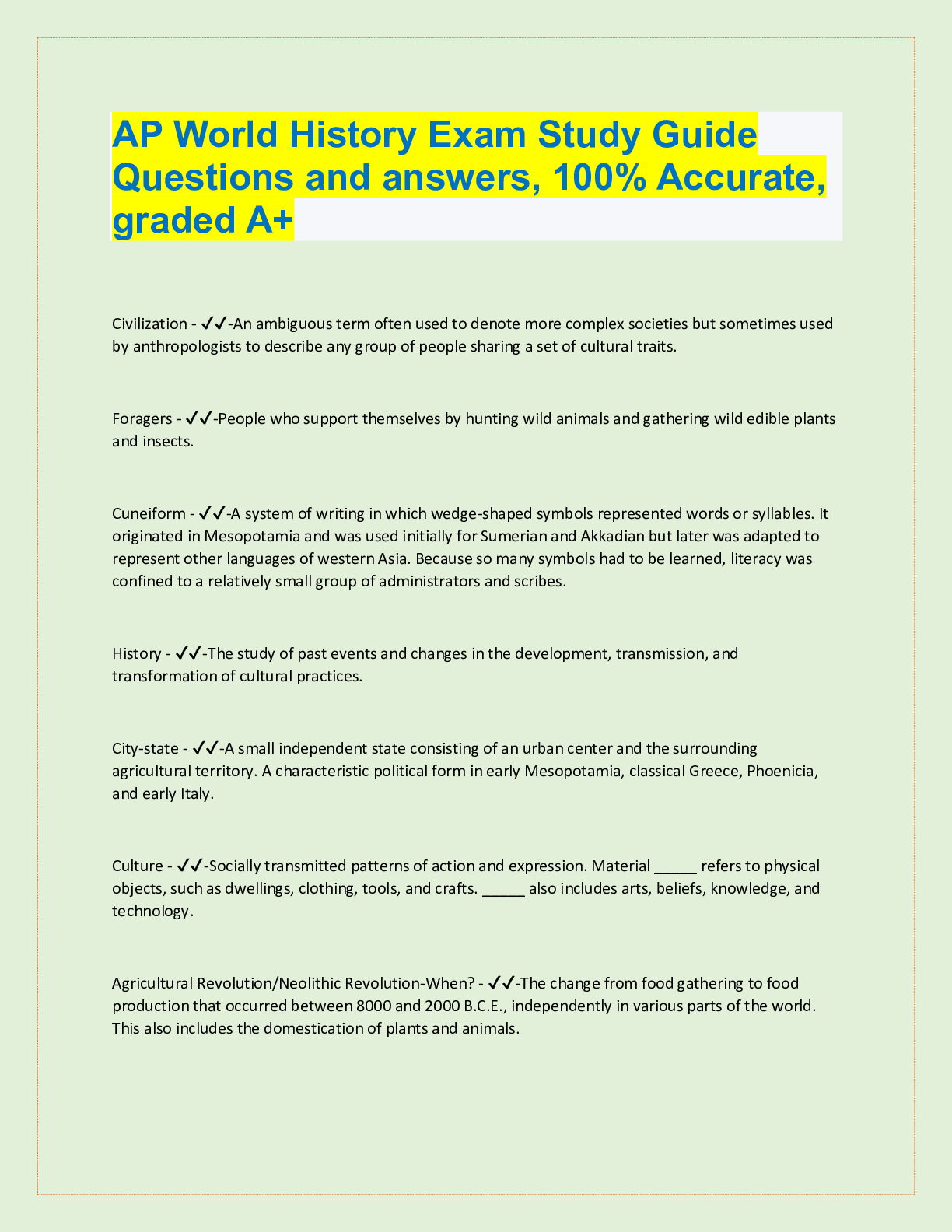
Buy this document to get the full access instantly
Instant Download Access after purchase
Add to cartInstant download
We Accept:

Also available in bundle (1)
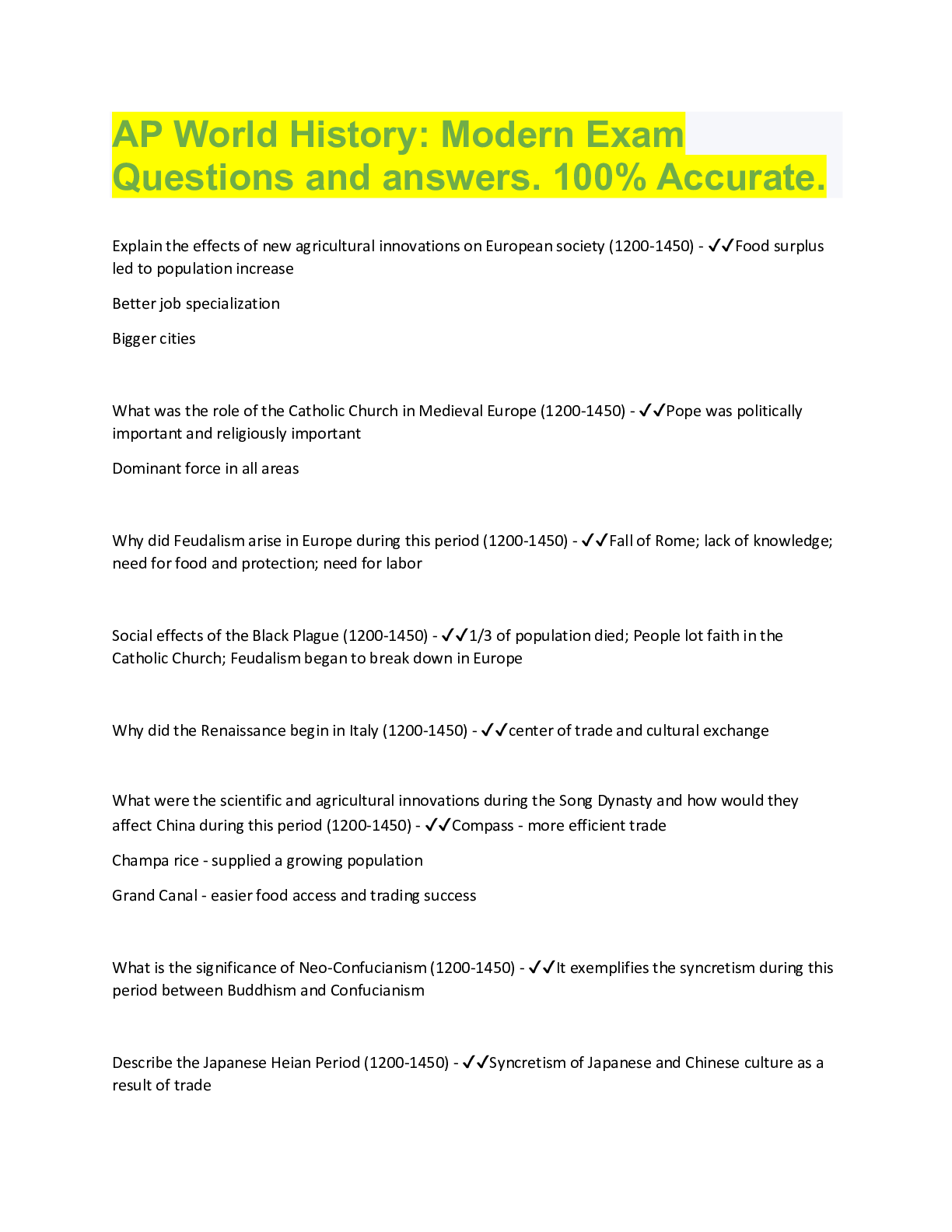
AP World History Exam BUNDLE, VERIFIED.
AP World History Exam Study Guide Questions and answers, 100% Accurate, graded A+. 25 VERSIONS, APPROVED
By Topmark 1 year ago
$34
28
Reviews( 0 )
$10.00
Document information
Connected school, study & course
About the document
Uploaded On
Mar 14, 2023
Number of pages
19
Written in
Additional information
This document has been written for:
Uploaded
Mar 14, 2023
Downloads
0
Views
45

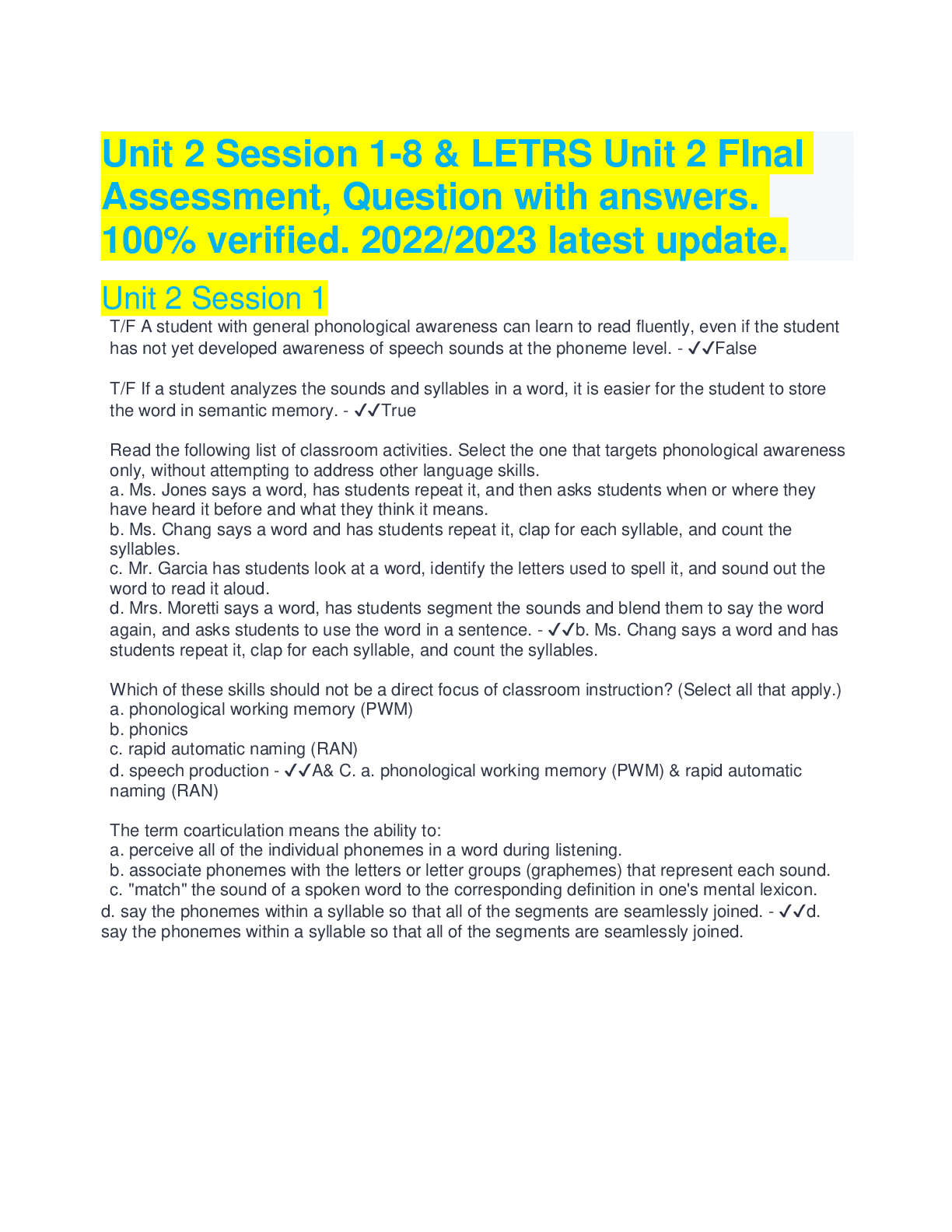
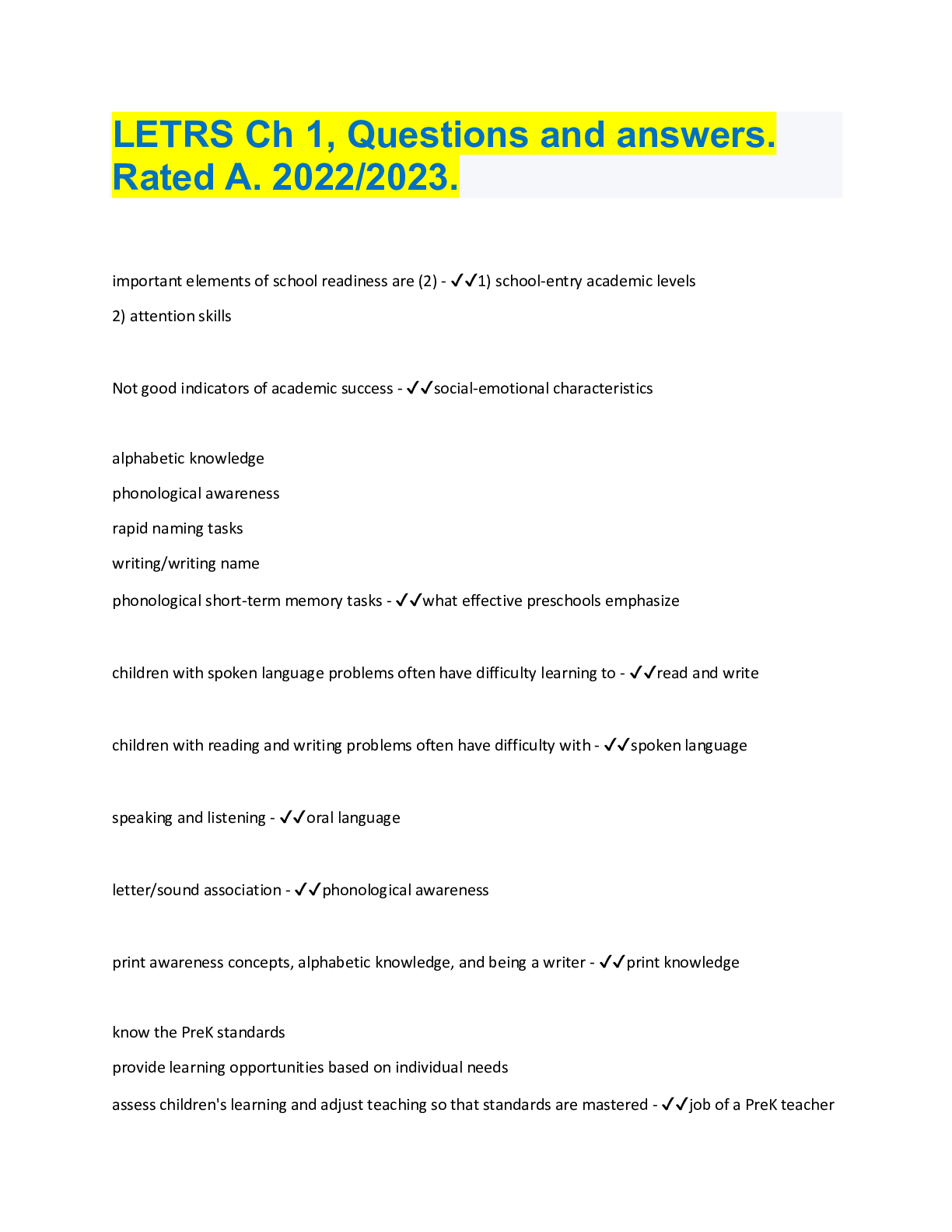
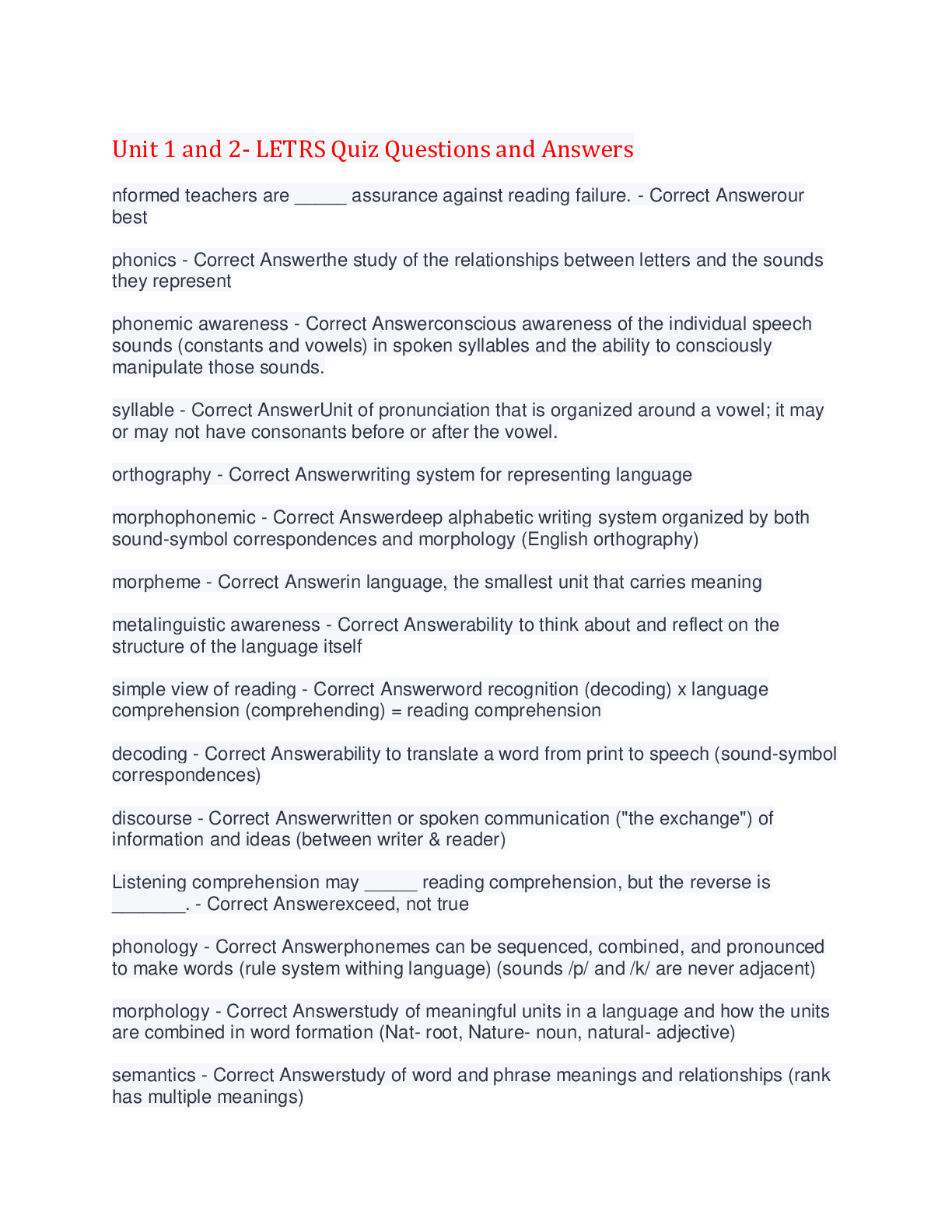
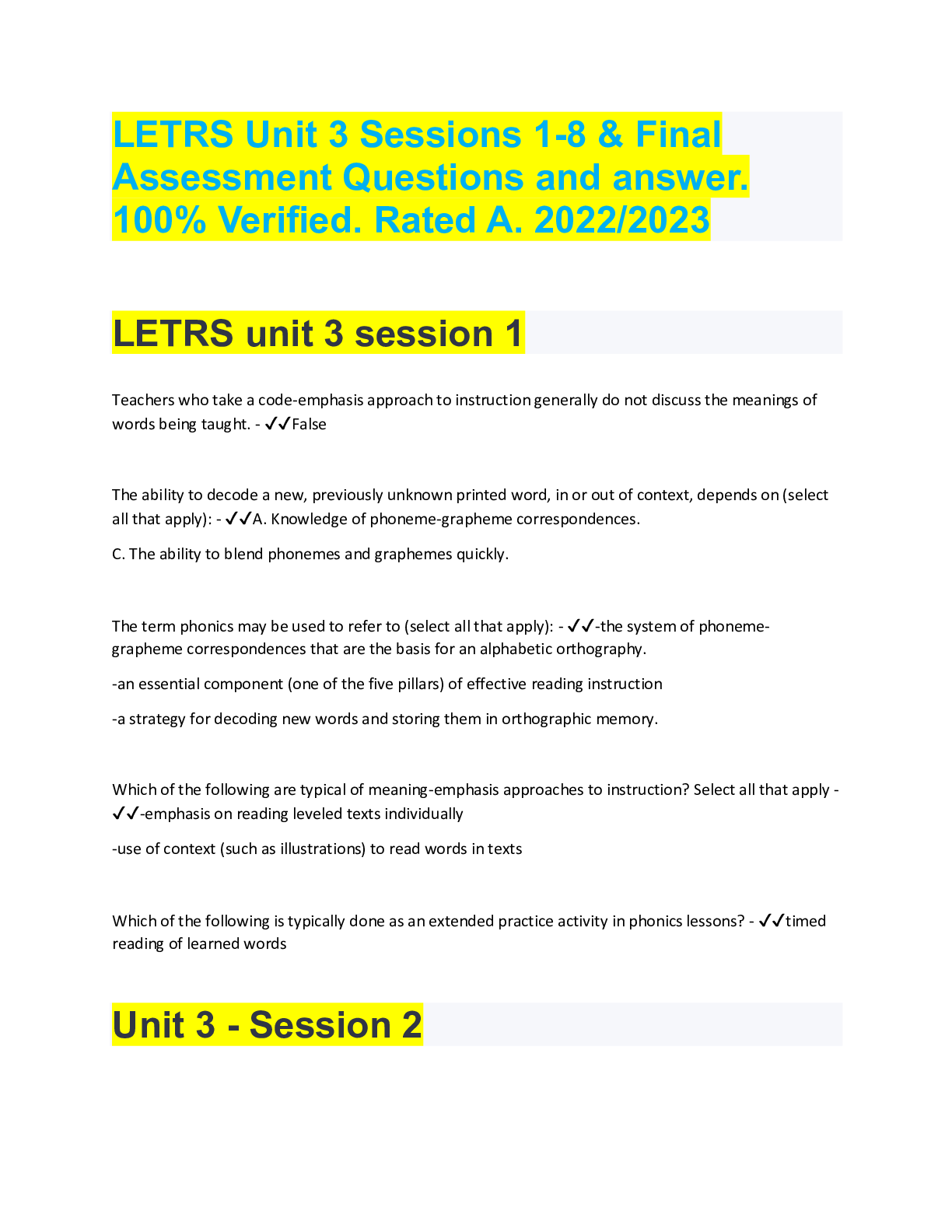

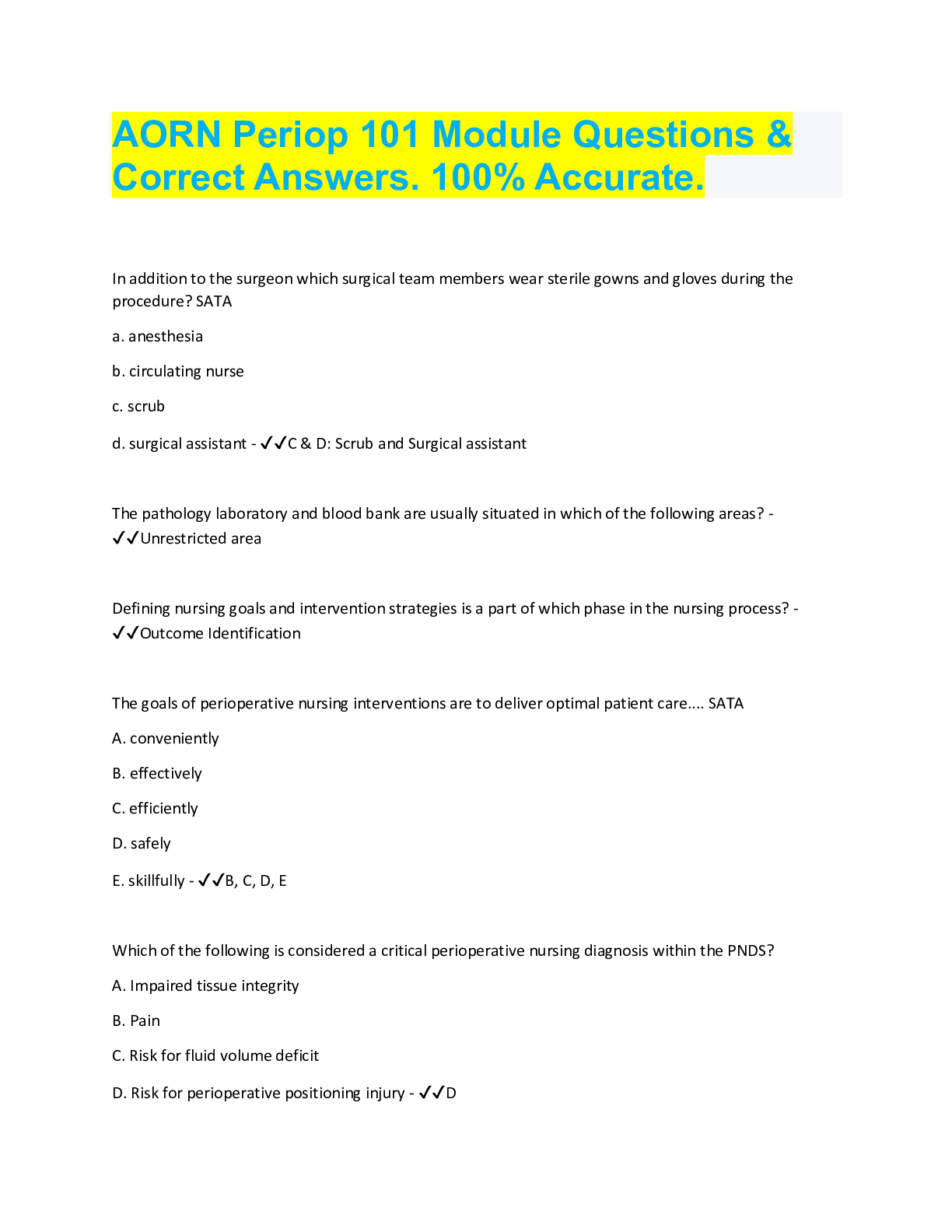
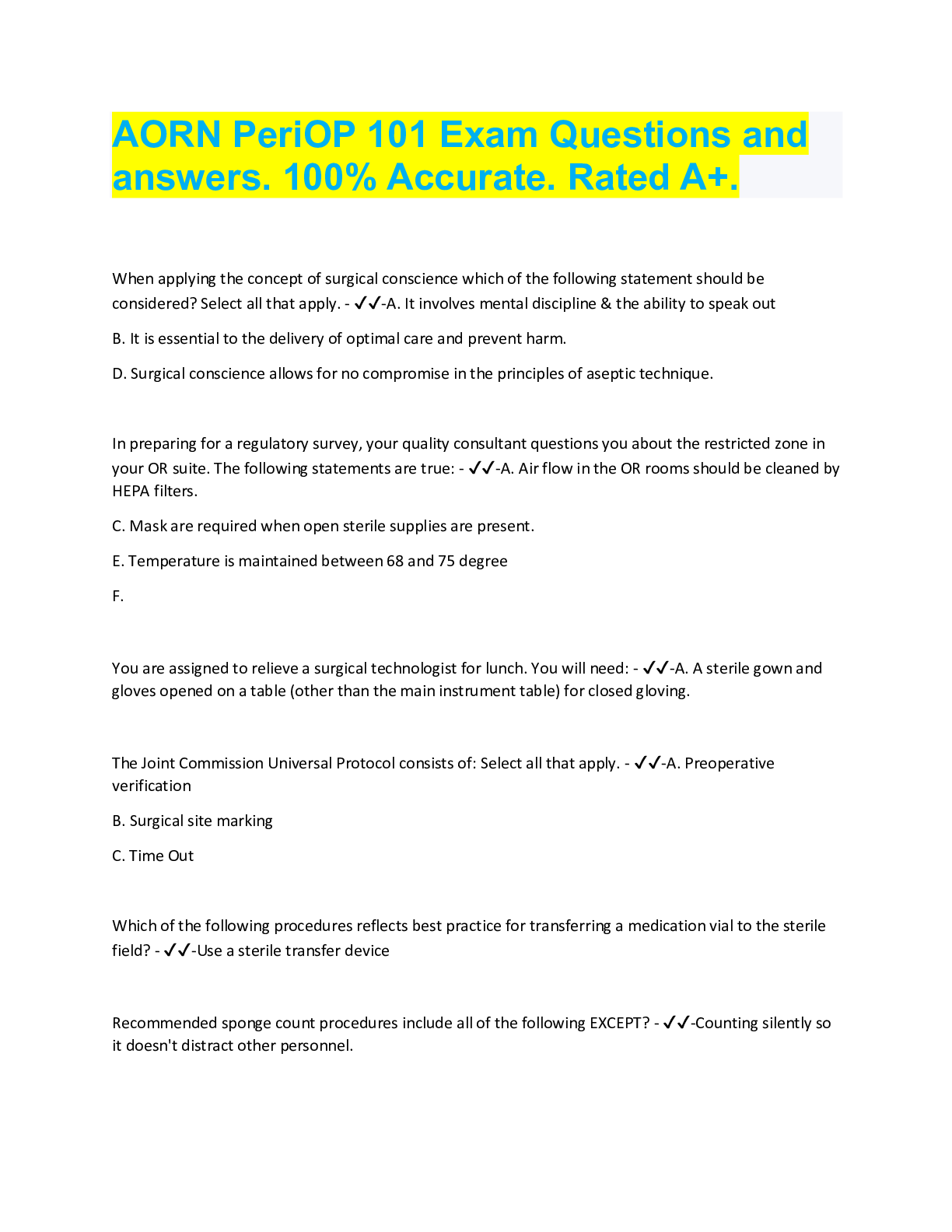
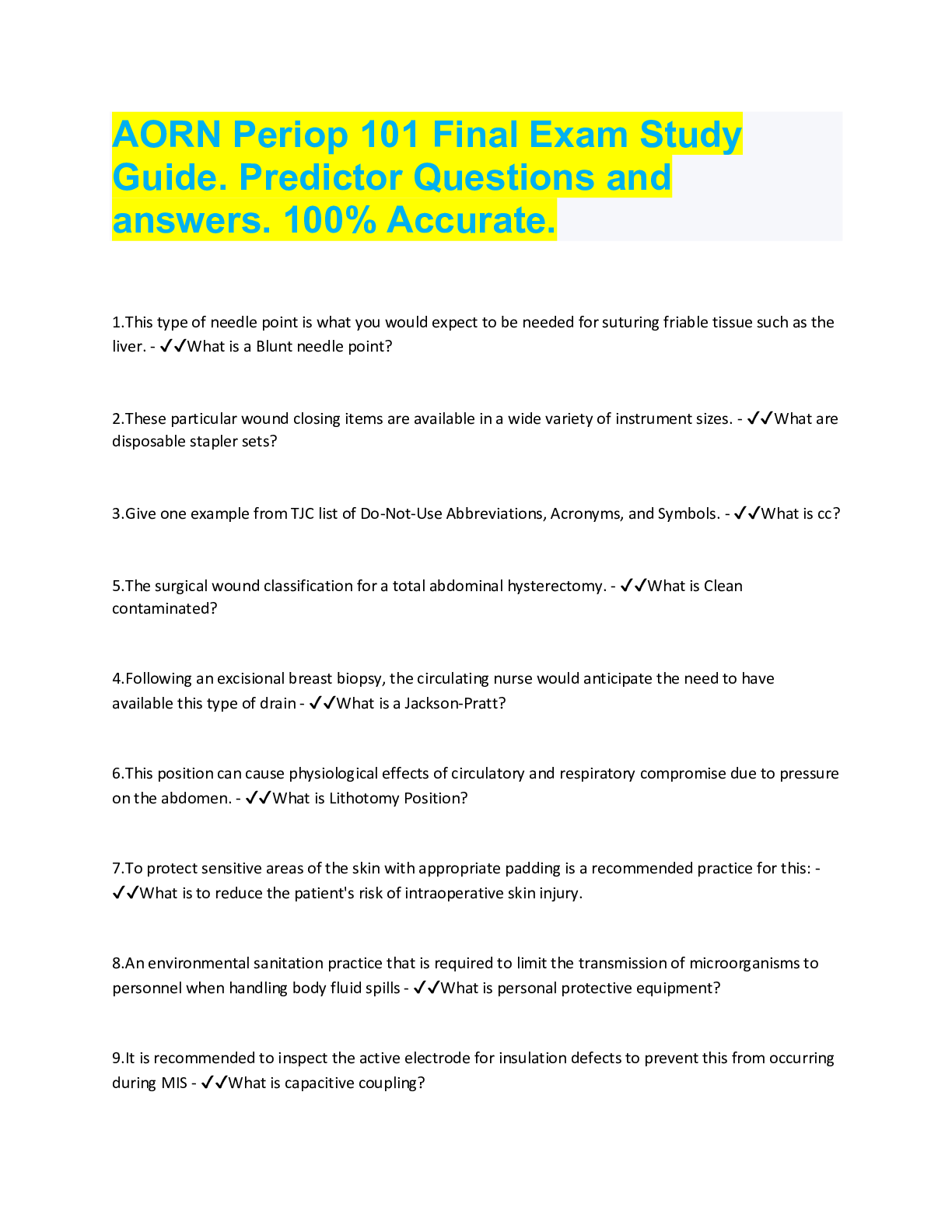
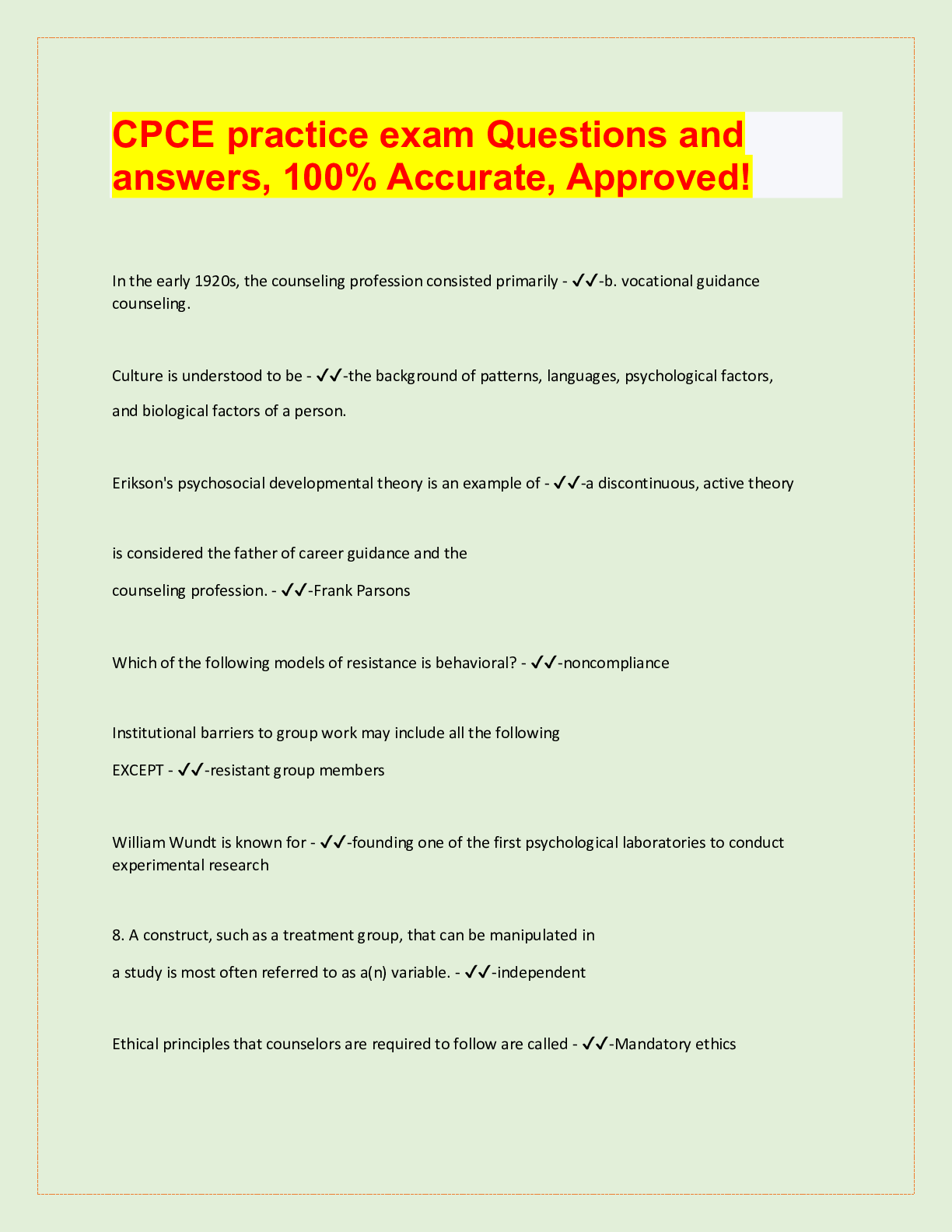


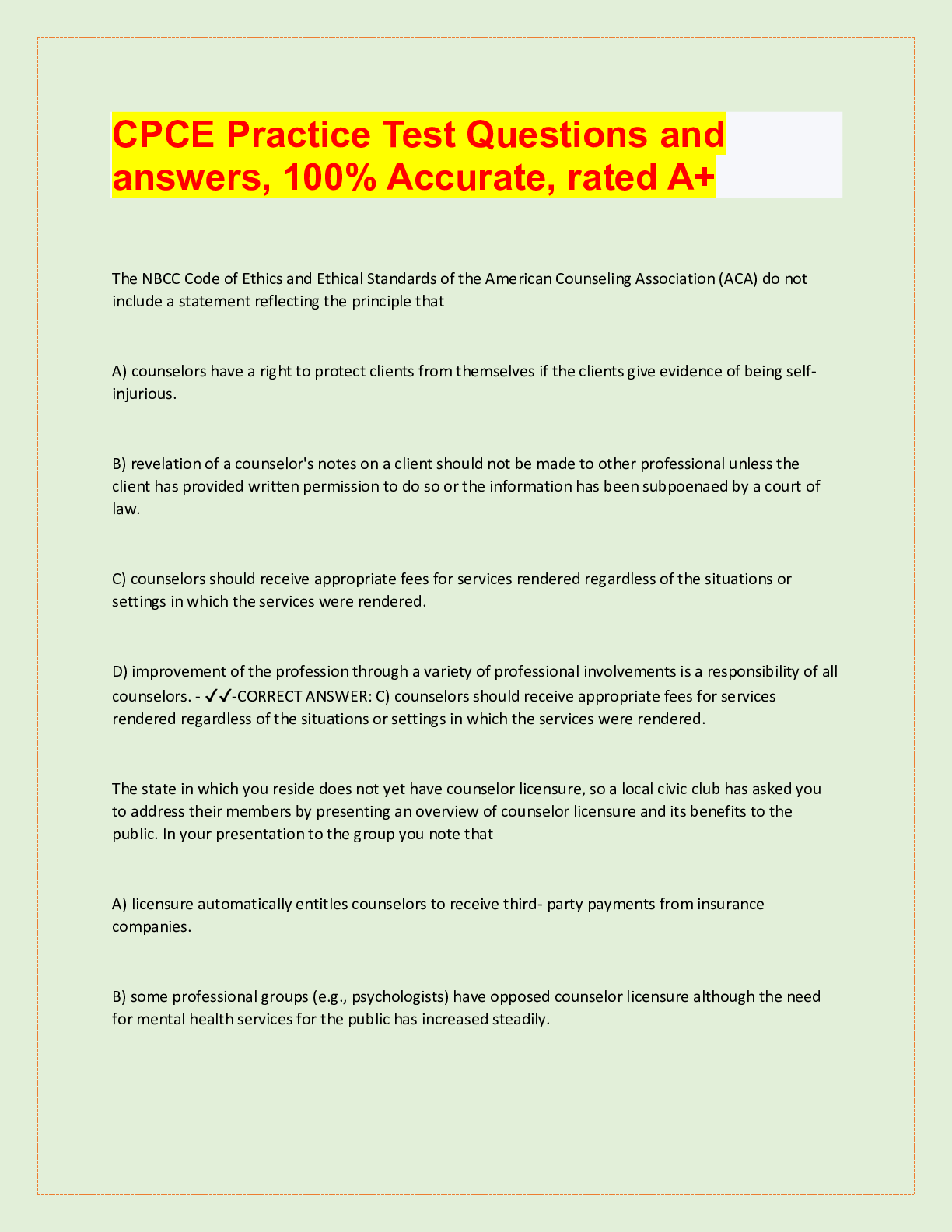
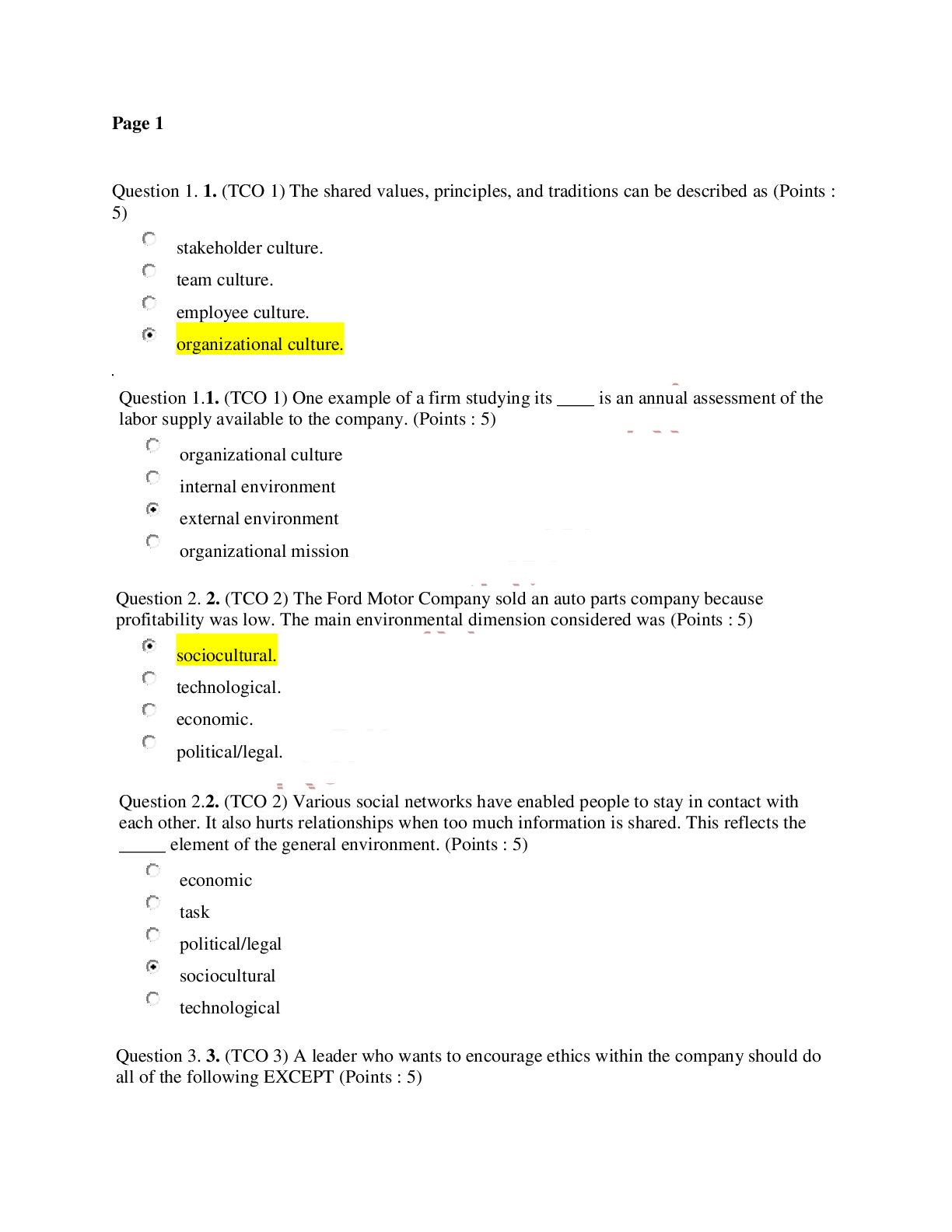

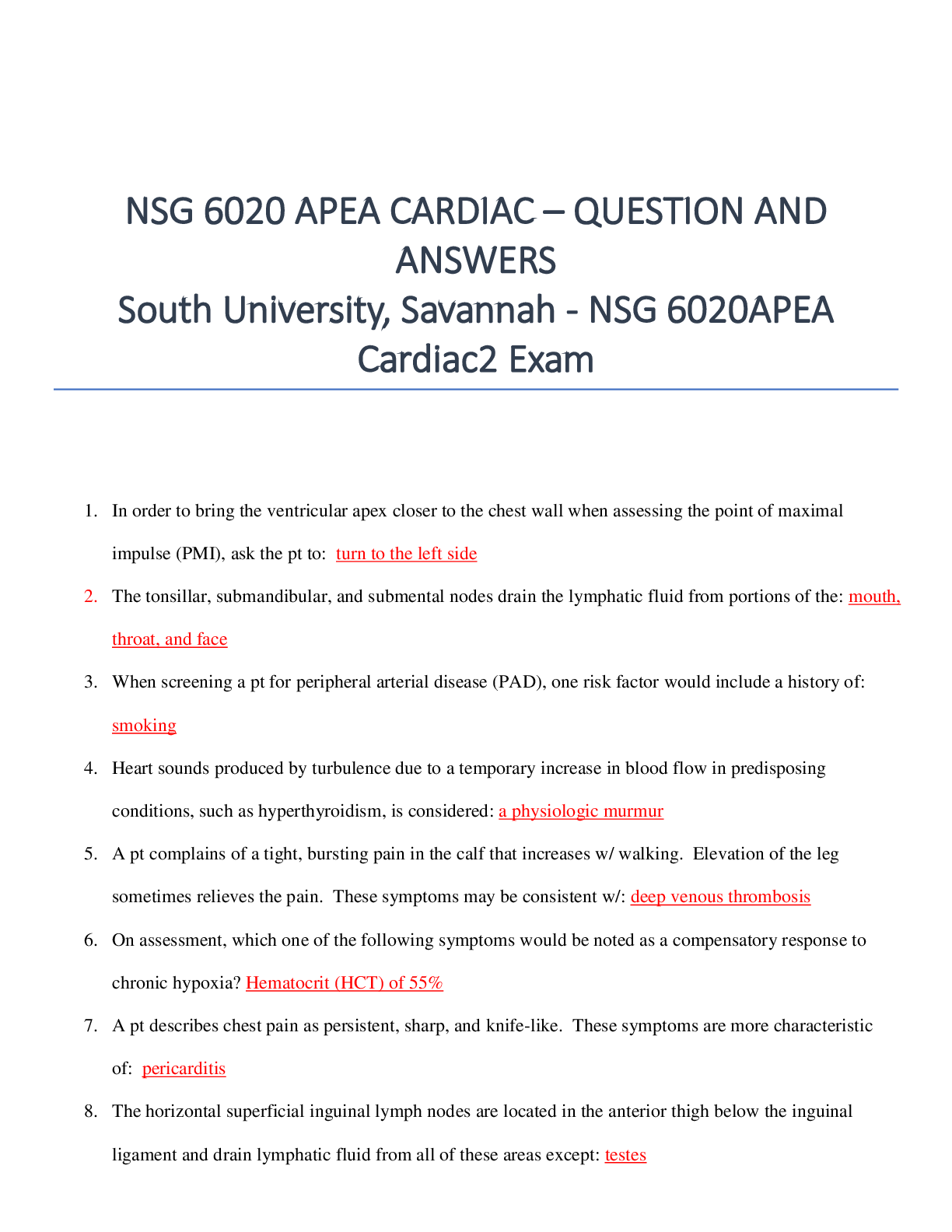

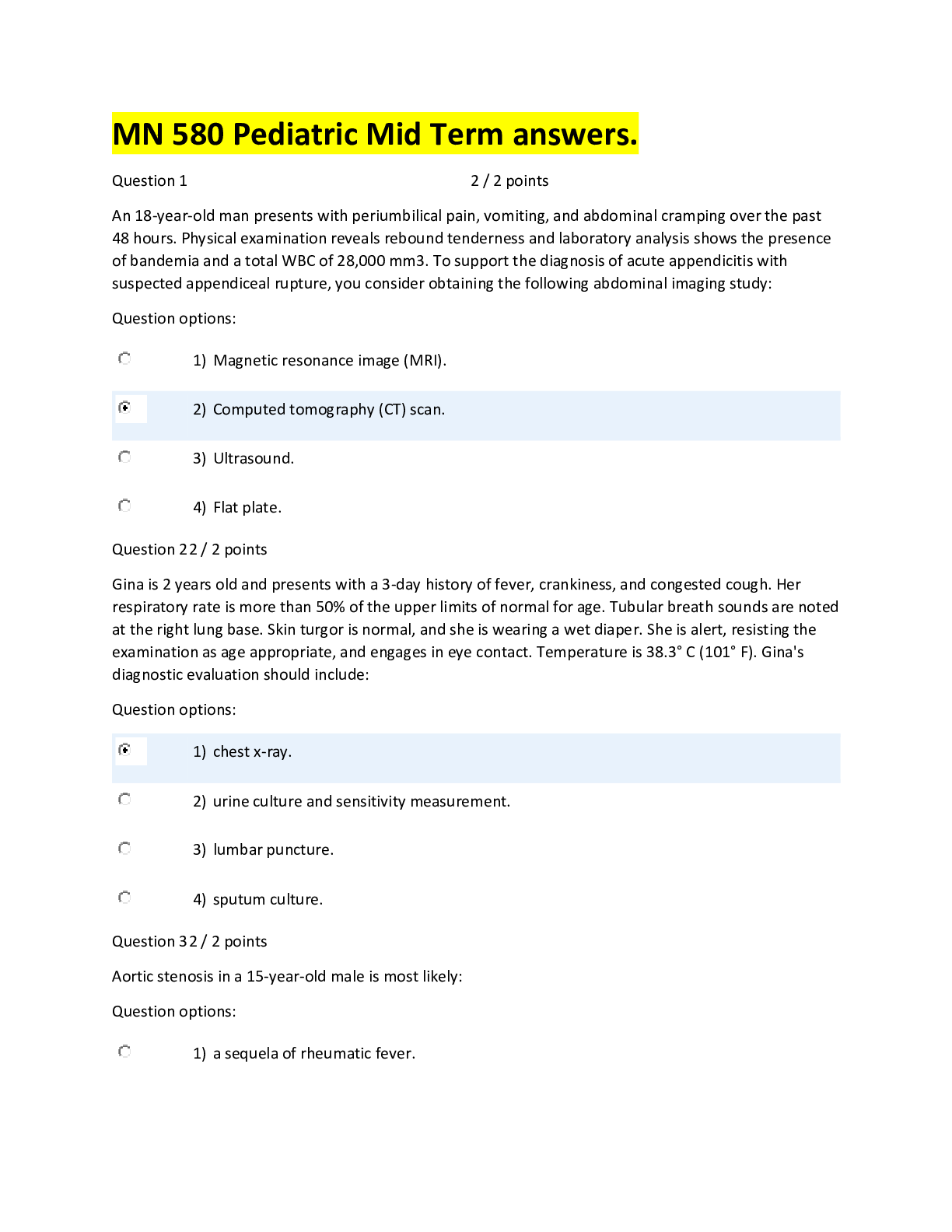
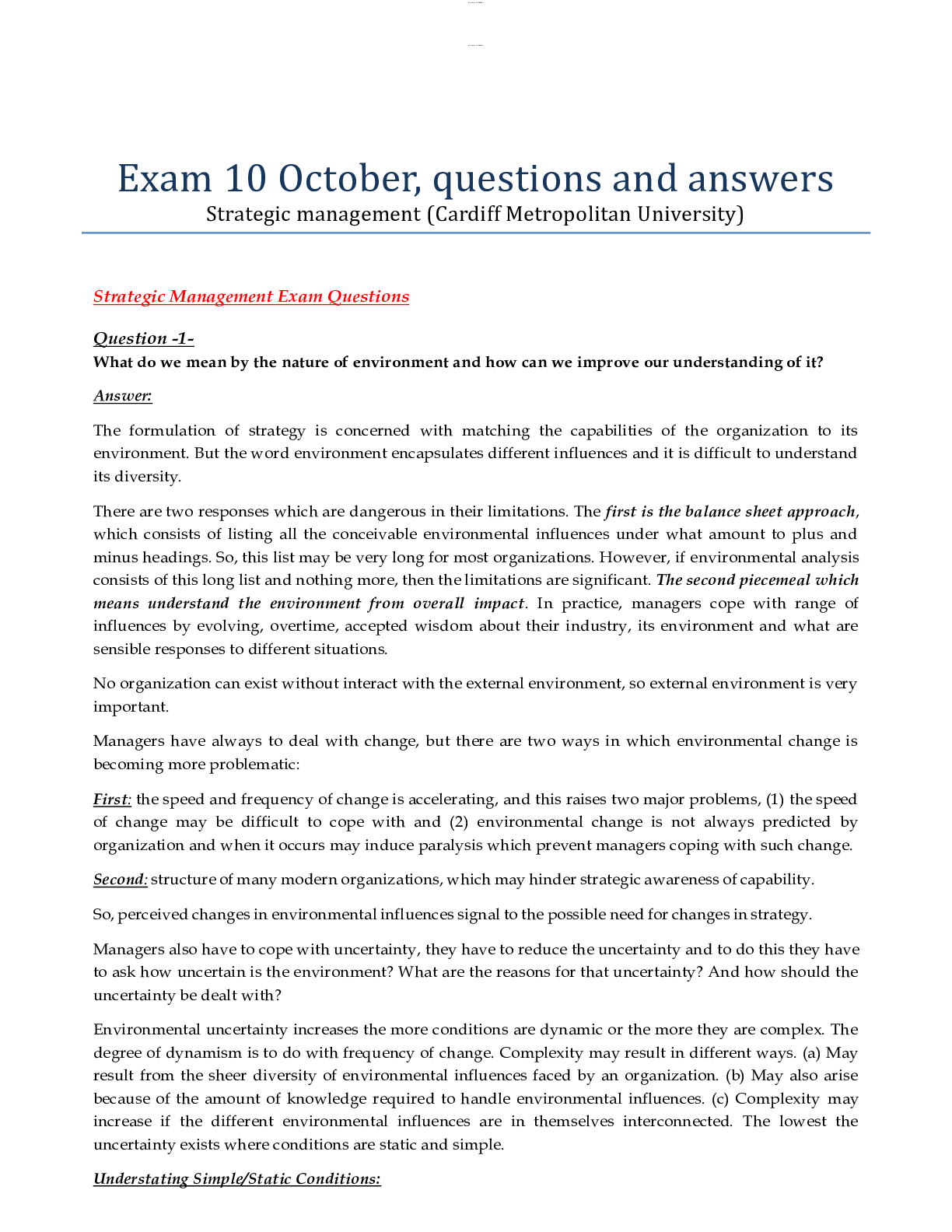
.png)
.png)
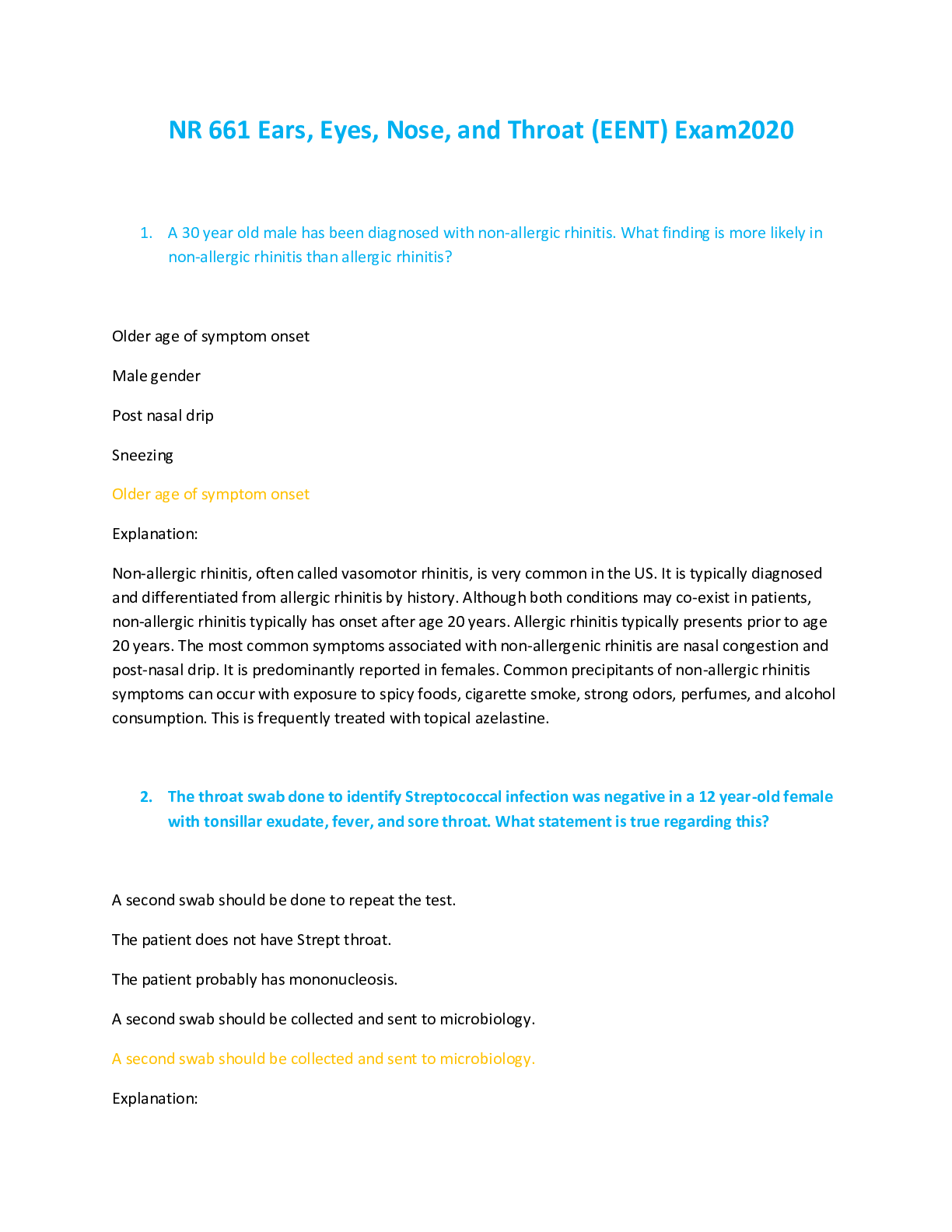
 ans (1).png)
.png)
.png)

